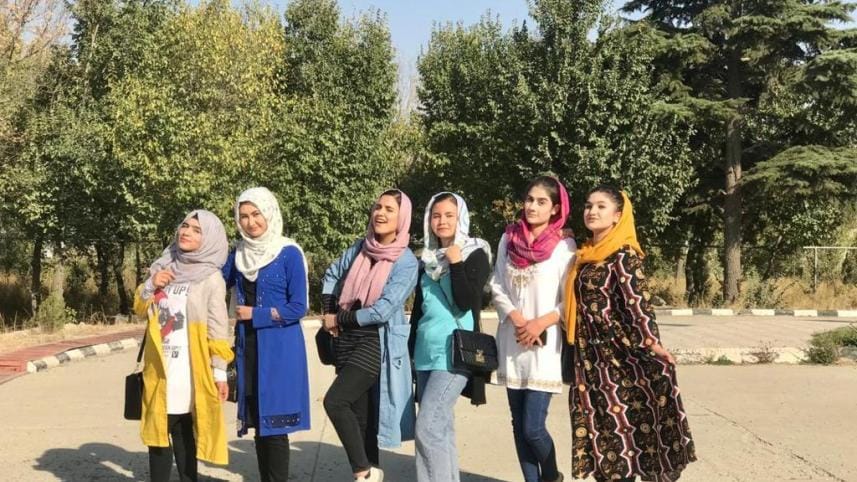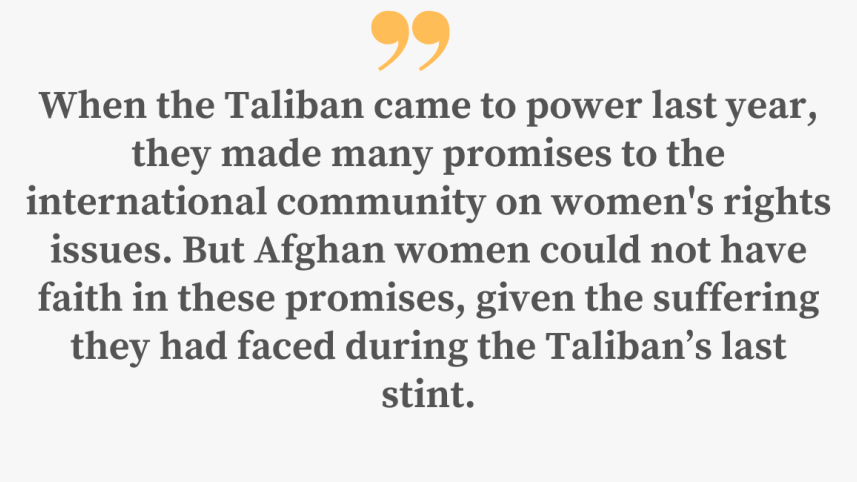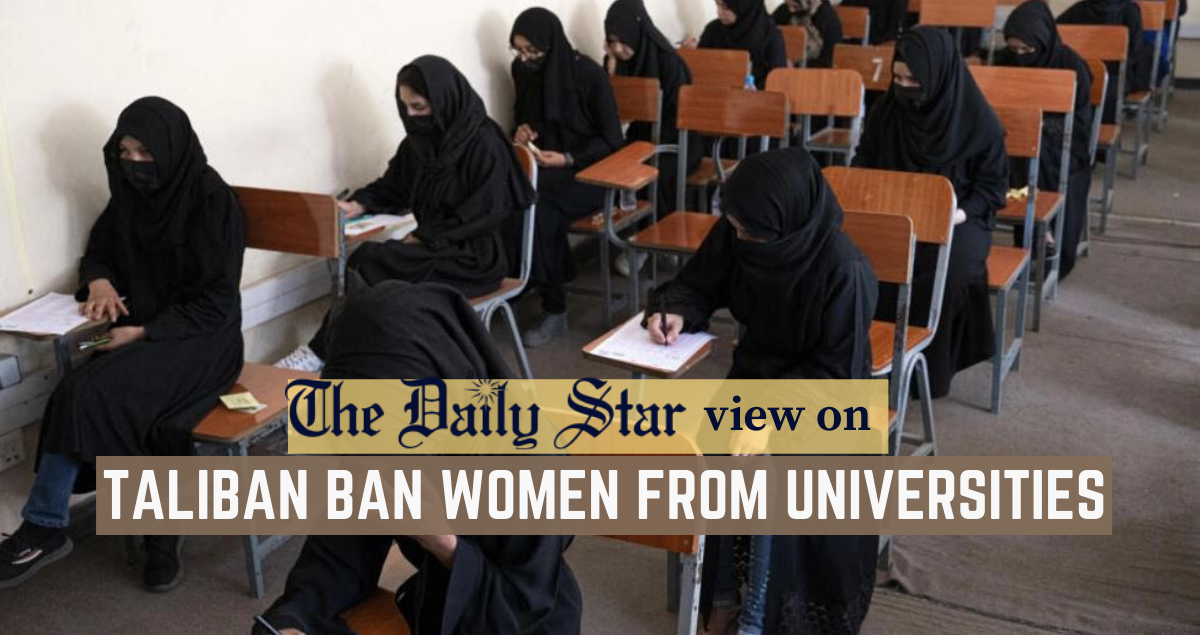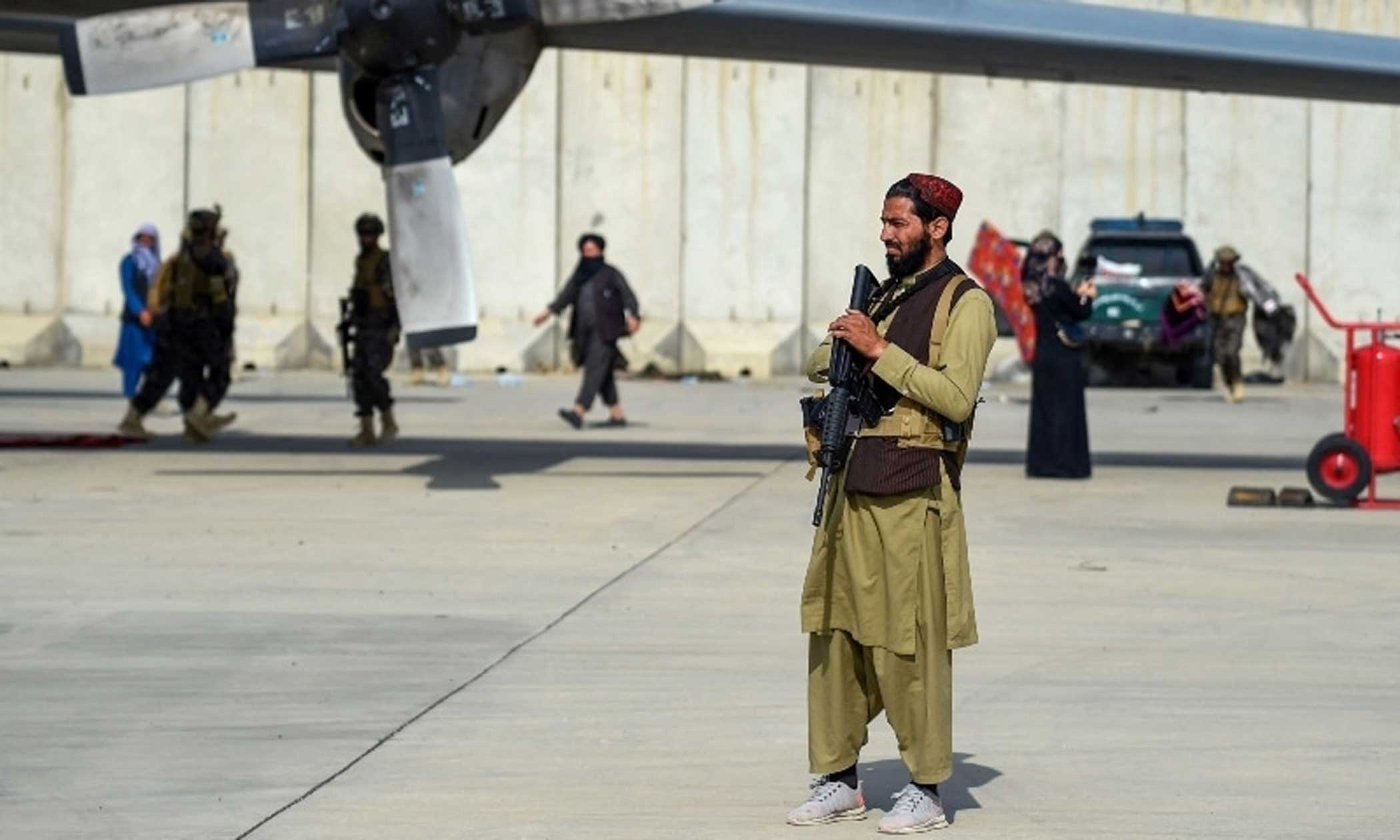Every political crisis in Afghanistan has caged women

A few days ago, the Taliban government of Afghanistan banned women from pursuing higher studies and working for NGOs, which repeats the history of the 1990s when they were in power last. Although Islam has clearly allowed women's access to education and work outside of the home, the Taliban denies these rights again and again. This is, of course, because they don't follow the principles of Islam.
When the Taliban came to power last year, they made many promises to the international community on women's rights issues. But Afghan women could not have faith in these promises, given the suffering they had faced during the Taliban's last stint. They were proven right when the Taliban stopped girls from going to high school in March last year. Recently, they banned women from working in various donor agencies and from pursuing higher education.
After this new ban, many NGOs that were working for the development of Afghanistan have stopped their operations, demanding the withdrawal of the irrational bans.
On the other hand, a new generation of Afghans, who have grown up with many dreams and freedoms in the last 20 years (during the Hamid Karzai and Ashraf Ghani regimes), find themselves in utter despair.
Khatera Qasemi, a 22-year-old who studies computer science at Kabul University, spoke to me over the phone a couple of days ago, relaying, "My country fell into the hands of the Taliban. And before they came to power, I worked as a broadcaster in the television media. After the Taliban took over Afghanistan, the lives of our journalists, especially of female journalists, are in danger. I am also a civil activist. I was a member of the youth integration process and worked in the Committee on Women's Affairs and Rights. The Taliban threatened all the people in our office, and eventually, our workplace became inactive. And I lost my job as well. Now the Taliban has closed the university gates for girls and I no longer have the right to study."
Khatera continued, "At home, my parents don't believe that I can progress in my life and this is my biggest pain because I feel left alone, as no one believes in me or my bright future. I don't know whether to complain about the stupidity of the Taliban or that of my family."
One young female activist, entrepreneur and NGO worker I had spoken to in 2021 when the Taliban had taken over, Nargis Nayeel Sadat, based in Kabul, shared her experience of how she had faced the Taliban's cruelty. The Taliban had snatched her house and business initiatives and filed a false case against her with the Afghan court. Her only fault was helping Afghan women and girls to become independent through small business initiatives. After all of that, Sadat wanted to end her life, but had to stay behind for her elderly mother.
Historically, Afghanistan has not been governed according to its constitution or the principles of Islam. Rather, the land has been governed according to local beliefs, traditions, and the customs of a conservative male-dominated social system.

But some visionary rulers of Afghanistan have indeed played an important role in empowering women in the urban areas in the last century.
The development of the social status of Afghan women began during the time of King Amanullah Khan (1919-1929). Between 1920 and 1927, King Amanullah and his wife Queen Soraya were able to establish two primary schools and a high school for girls in Kabul for the first time. The aim was to introduce Afghan women to the modern secular education system beyond traditional madrasa education. In 1928, 15 girls (from Kabul's royal families) who had graduated secondary school were sent to Turkey for higher education, but this was viewed differently by Afghans outside of Kabul and Herat, as it was against their social and traditional norms. Especially, sending unmarried women abroad to educate them was a sin in their eyes.
During the regime of Muhammad Zahir Shah (1933-1973), the first women's college was established in Kabul in 1950. In 1953, Muhammad Daoud Khan was appointed prime minister of Afghanistan. Daoud Khan took many steps to empower women, one of which was the appointment of women in government and semi-government offices. Girls gained the right to unveil their faces inside streetcars and horse-drawn carriages. The government tried to provide equal rights to men and women in society, but this led to revolts all over the country, especially in the eastern and southern regions, where the Pashtun population had more influence. Government offices and courts were vandalised and burnt and women who dared to unveil their faces were often killed by excited mobs.
It was during King Zahir Shah's reign that Afghan women got the right to vote in 1964.
In 1975, PM Daoud Khan tried to enact a new constitution in which both men and women were given equal rights under Article 27. This constitution gives Afghan women the right to choose a life partner of their own liking. But unfortunately, these rights of women were not enforced anywhere outside of Kabul, Herat and Mazar-e-Sharif, where the elite lived.
Again, when the Russia-backed People's Democratic Party of Afghanistan (PDPA) started its communist regime during 1978-92, they began forcing all girls to go to school. The Afghans rebelled, fearing that the un-Islamic education system would make girls turn into communists. As a result, a brutal two-year-long civil war started. After that, when the Taliban came to power in 1996, the dreams of women were buried. They stopped women's education altogether, confined them behind veils, and took away their right to work outside.
Between 2001 and 2021, women were again allowed to study and work outside the home. But misfortune befell them in 2021 when the Taliban regained power.
In the last 100 years, there have been a lot of changes in political power in Afghanistan. Sometimes, hardliners came to power and confined women within four walls. Sometimes, liberal rulers came along and women were able to go outside of their homes. The foreign-backed governments also went against Afghan culture and tried to empower women in their ways, which never met much success.
However, some NGOs were able to educate Afghan girls and women in the last 25 years, even when the Taliban had first taken over. They were successful in urban and rural areas because they respected local traditions, engaged with men, listened to their concerns, applauded their inputs (sometimes to earn their trust), and then implemented pragmatic education through agreement with the local community.
The bottom line is that, even during the Taliban era of before, Afghan girls had learned and worked covertly or overtly, through understanding and negotiating with the local community. Now, the world must come forward again to listen to Afghan women and to their demands for education.
Mostafa Shabuj is the Bogura correspondent for The Daily Star.




 For all latest news, follow The Daily Star's Google News channel.
For all latest news, follow The Daily Star's Google News channel. 

Comments